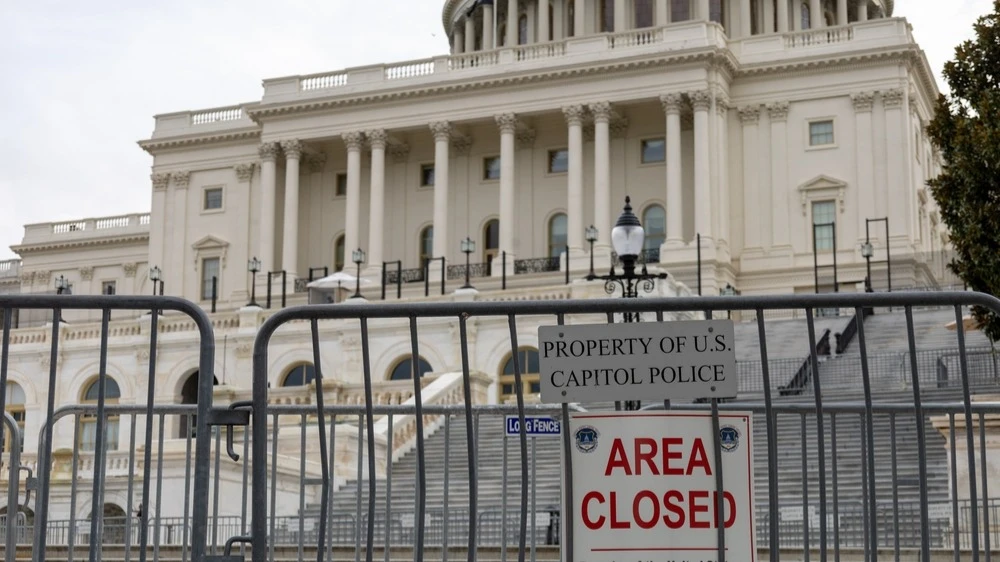The U.S. has its first shutdown in seven years. What does this change for investors?
A sharp standoff in Congress raises the risk of a protracted conflict

U.S. stock index futures declined after the first shutdown of U.S. government agencies in seven years due to lack of funding. The shutdown has disrupted one of the country's largest employers and threatens delays in the publication of key economic data. December contracts on the S&P 500 fell 0.8 percent and the Nasdaq 100 fell 1 percent. The dollar index fell for the fourth straight day, gold hit a record high above $3875 an ounce.
U.S. government agencies shut down on October 1 because Democrats and Republicans in Congress could not agree on their funding before the start of the new fiscal year. This is the first shutdown since the longest government shutdown on record. It happened during Donald Trump's first term as president and lasted nearly five weeks, from late December 2018 to late January 2019.
The stock market in general tends to ignore budget disputes: the S&P 500 index on average almost did not react to 20 previous shutdowns, Bloomberg writes with reference to Truist data. Wall Street professionals are keeping their portfolios unchanged this time too, the agency notes. However, the current confrontation between Congressional leaders looks sharper, which increases the risk of a protracted conflict that could damage the world's largest economy. The Trump administration has announced its intention not just to put federal employees on administrative leave, but to fire them, which could lead to an increase in unemployment amid an already unstable labor market, Bloomberg warns.
Macro statistics and interest rates
The main macroeconomic consequences of the shutdown lie on the plane of the labor market and forecasts on the trajectory of interest rates. The publication of statistical data by government agencies will cease. This week, that means no data on jobless claims, factory orders and the September employment report - key indicators on which Wall Street bases its forecasts for economic growth and Fed Funds rates, Bloomberg emphasizes.
"If we didn't get [the] right data, if we didn't get the labor market report and, moreover, if we didn't get the inflation report, I think that would definitely be a major risk," Vantage Markets analyst Hibi Chen said on Bloomberg Television. - And I should note that this is a risk the market has not yet priced into prices at this stage."
Stock market
An additional risk factor is the prolonged rally in the US stock market, which has brought asset valuations to levels typical of periods of euphoria. With low volatility and positioning for a pre-New Year's rally, even a slight decline in asset prices could lead to forced selling that would exacerbate the downturn. In such a situation, "small bad news can snowball into a full-blown correction," warned Michael Bailey of FBB Capital Partners, as quoted by Bloomberg.
- Defense sector. Shares of RTX, L3Harris Technologies and other U.S. defense companies showed strong growth thanks to government spending on munitions, drones and missile defense projects. But the shutdown could cool investor enthusiasm for those securities, as well as Boeing and Lockheed Martin shares, which hit all-time highs earlier this week. "We don't expect a significant fundamental impact [of the shutdown] on defense companies, but sentiment could worsen," Bloomberg quoted TD Cowen analyst Gautam Khanna as saying.
- Government contractors. Companies that provide consulting and IT services to the government, such as Booz Allen Hamilton, Leidos and CACI International, could be affected. Their revenue has declined during government shutdowns in the past, albeit only slightly, according to Truist's Toby Sommer. However, prolonged downtime is likely to hit profits, Bloomberg writes.
- Air transportation. Airlines, which receive up to 2% of their revenue from U.S. government contracts, are also vulnerable. A long pause in this revenue stream would negatively impact the attractiveness of an industry that is already struggling. In addition, thousands of federal employees left without a paycheck could cut back on tourism spending, according to Sheila Kahyaoglu of Jefferies. On Sept. 30, the S&P 1500 Airlines Index fell 1.9 percent, ending its worst month since March.
- Cyclical stocks. The key here is the impact of the shutdown on the economy. If it lasts long enough to significantly slow economic growth and raise unemployment, it will jeopardize investor sentiment in industrial and financial stocks - from banks to investment funds, says Matt Gertken, chief geopolitical strategist at BCA Research. Investors wary of the shutdown's negative impact on cyclical stocks may switch to defensive sectors such as health care and utilities, the economist added.
IPO market
Companies planning IPOs or other securities offerings in the US could find themselves in limbo during the government shutdown. Law firm Cooley warned that players needing SEC (US Securities and Exchange Commission) approval on their IPO filings or clarification of regulatory issues face a "major logistical challenge". And this applies not only to the downtime period, but also to the time after the shutdown - because of the need to sort through the backlog of applications, Cooley emphasized.
Gold and currencies
If the standoff in the U.S. Congress drags on, analysts expect gold to retain its attractiveness as a safe haven asset despite rising to a record high near $4,000 per troy ounce, Bloomberg writes. Part of this rally is due to the weakness of the dollar, which traditionally declines during shutdowns. Further weakening of the U.S. currency could benefit the Japanese yen and possibly the euro, believe ING.
This article was AI-translated and verified by a human editor
